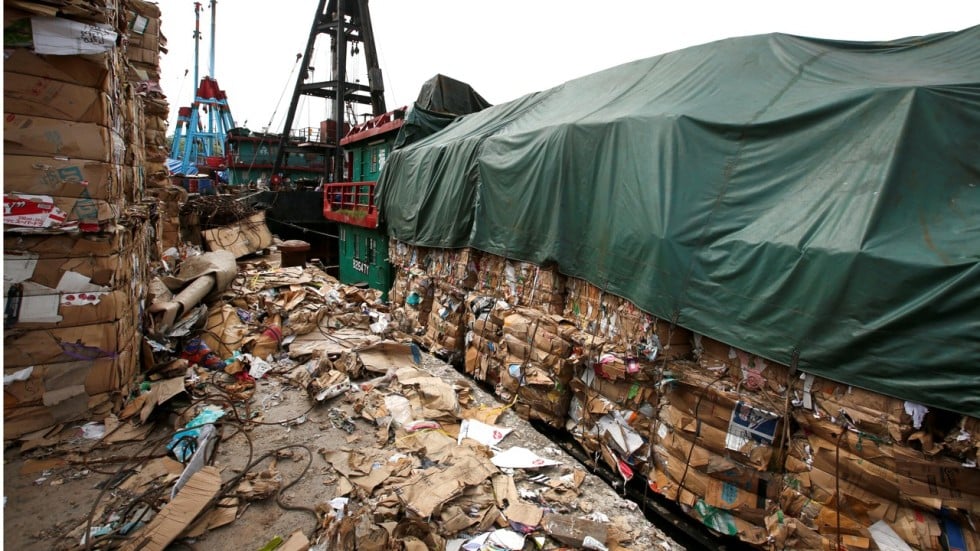

Recycling policies tightening, costs surging in wake of
China policy
By Sean F. DriscollPosted May 27, 2018
If it seems a little tougher and more expensive to deal with household recyclables lately, it’s not imaginary — and it’s not going away any time soon.
In China, a policy called National Sword has raised the standard for the amount of contamination allowed in recycling and banned certain types of waste from entering the country. Contamination rates of 1 percent to 3 percent are the industry standard, but China is requiring contamination of less than 0.5 percent; that change has put the squeeze on companies throughout the recycling supply chain in the United States and has resulted, in some cases, in increasing costs to customers.
At the Yarmouth disposal area, the large metal bins where residents can drop their recyclables for free have been subject to new, more stringent regulations, said town Public Works Director Jeff Colby. The newspaper bin is now just for newspapers — no more brown paper bags or the occasional office envelope, which are now directed to the mixed paper bins. And no paper at all should end up in the comingled bins, where plastic, glass and metal objects end up.
“It’s about changing people’s habits,” Colby said. “It’s a challenge to get them to do it in a different way. We’re trying to encourage recycling as we always have.”
The town can sell its collected newspapers, mixed papers and metals to recycling vendors, Colby said, but the product now has to be “cleaner” than ever before, meaning no errant mixing up of materials, lest the town be charged instead of paid for its materials. The comingled recycling goes to the Covanta [SEMASS] facility just north of the disposal center before being hauled by train to its facility in Rochester, Colby said, at a cost to the town of $90 a ton.
Considering the newsprint sells for $120 a ton, “there’s a big swing there,” Colby said. “The more we can pull that out of the recycling stream, if we can encourage that, changing behaviors will help us out.”
Colby said the town is considering charging residents for using the recycling facility, which is now free. Either a nominal fee of $5 or a more expensive one in the $20-$30 range may be implemented after the Board of Selectmen takes up the issue later this year, he said. Most towns on the Cape now charge some fee for their recycling drop-off facilities if residents do not already have a trash sticker.
For those residents who pay to have curbside trash pickup, costs for the recycling services are starting to go up at places like Macomber Sanitary Refuse, which takes its recyclables to the Bourne Integrated Solid Waste Management Facility.
At Nauset Disposal, owner Shawn DeLude said cost increases may be on the horizon as facilities that accept the recycled materials are becoming more expensive, and more full, as time goes on.
“It’s challenging on the Cape because there aren’t many avenues for the endgame of getting rid of them,” he said. “As China has tightened its acceptance, the facilities we do utilize are becoming full and unable to accept our materials at times as they try to find avenues to process and get rid of their materials.”
Nauset will continue to offer single-stream recycling to its curbside customers, allowing them to put all their recyclables into a single container without sorting, but is about to launch an education campaign about what, precisely, can and cannot end up in those bins, DeLude said.
“The tolerance level just doesn’t exist anymore,” he said.
In New Bedford, the city is suing ABC Recycling over extra fees the company has charged since November. The town claims the fees are not in the contract, but the New Bedord-based hauler says circumstances beyond its control — namely, China’s new policy — have led to increased costs.
Company CEO Michael Camara said the recycling market has become “a disaster, a crisis” since China changed its policy.
Jason Hale, vice president of communications for the Recycling Partnership, a national nonprofit group, said the quality of materials the United States is shipping to China is declining.
“It’s a real market issue,” he said. But at the same time, Hale said China’s move is not some kind of bellwether for a problem with recycling.
“Markets ebb and flow, and this is a short-term issue,” he said.
No comments:
Post a Comment